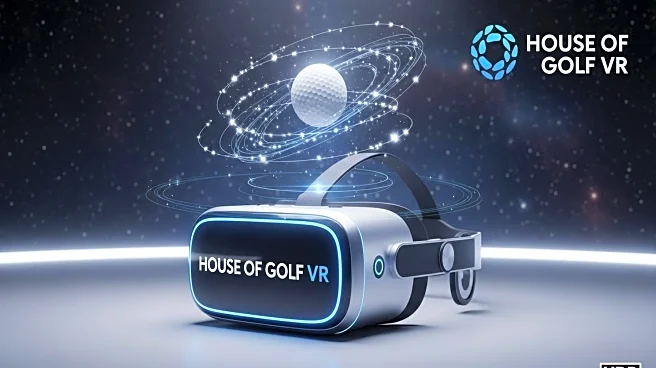What's Happening?
Starlight Games, formerly known as Atomicon, is set to release a new entry in its mini golf series, House of Golf VR, on October 30th for Quest users. This game introduces mixed reality (MR) and virtual reality (VR) modes, allowing players to transform their physical spaces into custom mini golf courses. Users can select from a variety of obstacles and whimsical items such as mini-cranes and hot air balloons to create their courses. The VR mode immerses players in vibrant locations filled with interactive puzzles and competitive championships. The Liverpool-based studio, which rebranded in early 2024, aims to focus on new intellectual properties, including futuristic sports and sci-fi rogue-lite action games.
Why It's Important?
The launch of House of Golf VR represents a significant advancement in the integration of mixed reality in gaming, particularly for VR platforms like Quest. By allowing players to customize their physical environments, the game enhances user engagement and offers a unique gaming experience. This development could influence the future of VR gaming, encouraging other developers to explore MR capabilities. The game's release also highlights the growing trend of immersive gaming experiences, which could impact the VR industry by increasing demand for more interactive and personalized content.
What's Next?
As House of Golf VR prepares for its release, the gaming community and VR enthusiasts are likely to monitor its reception closely. The success of this game could prompt other developers to incorporate mixed reality features into their projects, potentially leading to a broader adoption of MR in gaming. Additionally, Starlight Games' focus on new IPs suggests further innovations in the VR space, with potential announcements of new titles that could expand their portfolio and influence the industry.
Beyond the Headlines
The introduction of mixed reality in House of Golf VR may have broader implications for the gaming industry, particularly in terms of user interaction and game design. By leveraging MR, developers can create more dynamic and engaging experiences that blur the lines between virtual and physical worlds. This could lead to ethical considerations regarding privacy and data usage, as MR games require detailed scanning of users' environments. Furthermore, the game's success could inspire cultural shifts in how people perceive and interact with digital content, potentially influencing future technological advancements.









